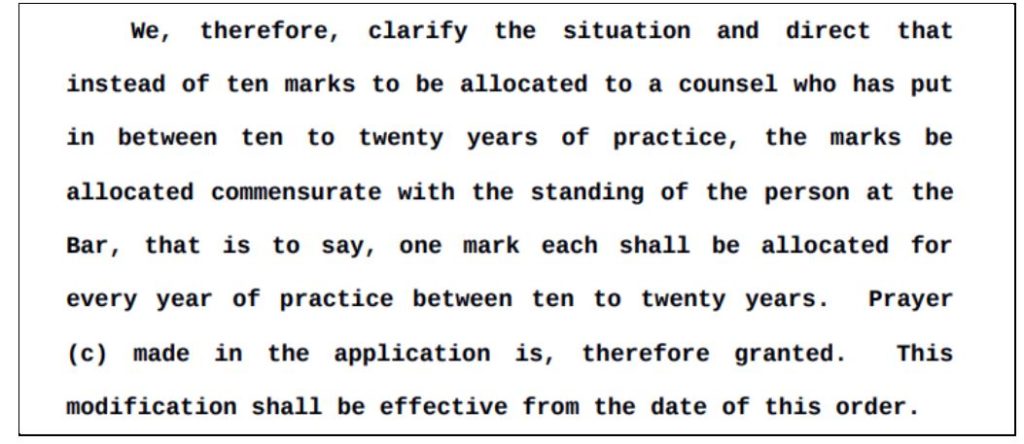In this week’s review of Court Judgements, we look at the observations & directions of the Supreme Court about judicial dishonesty & misconduct, vaccine mandates, about how mere suppression of material information irrespective of whether there was a conviction or acquittal doesn’t mean that the employer can arbitrarily terminate an employee.
SC: Undue favour to a party under the guise of passing judicial orders is the worst kind of judicial dishonesty and misconduct
In Muzaffar Hussain vs. State of Uttar Pradesh, the appellant was a former official of the Uttar Pradesh Judicial Services. The departmental query of the Allahabad High Court noted that he had decided cases of land acquisition matters violating the laid principles and had increased the compensation of the cases multiple times more than the investments made by the subsequent purchasers of the land, favouring them though they had no right to receive the compensation. In 2006, the state of UP punished him with curtailment of his pensionary benefits by 90%. The petitioner challenged this in the High Court which reduced the punishment to 70% and refused to interfere with the findings. The petitioner then filed an appeal at the Supreme Court.
The Supreme Court bench comprising Justices DY Chandrachud and Bela M Trivedi dismissed the appeal observing that the appellant had given judgement by violating the cardinal principles of law, equity, and against all judicial norms and propriety by favouring the purchasers who had no right to receive the compensation. The Bench stated that displaying undue favour to a party under the guise of passing judicial orders is the worst kind of judicial dishonesty and misconduct.
It added that the judgement should be passed by the judges taking into consideration the facts on record and the laws that are applicable to the case. In this case, for example, the Bench noted that there was adequate evidence to support the misconduct of the appellant bypassing judicial orders without abiding by the legal provisions to favour a party. The Bench also added that in case the judge delivers the judgement for extraneous reasons, it means that they are not discharging their duty as per law. Quoting “a judge, like Caesar’s wife, must be above suspicion”, the SC Bench stated that “the public servants are like fish in the water, none can say when and how a fish drank the water”.
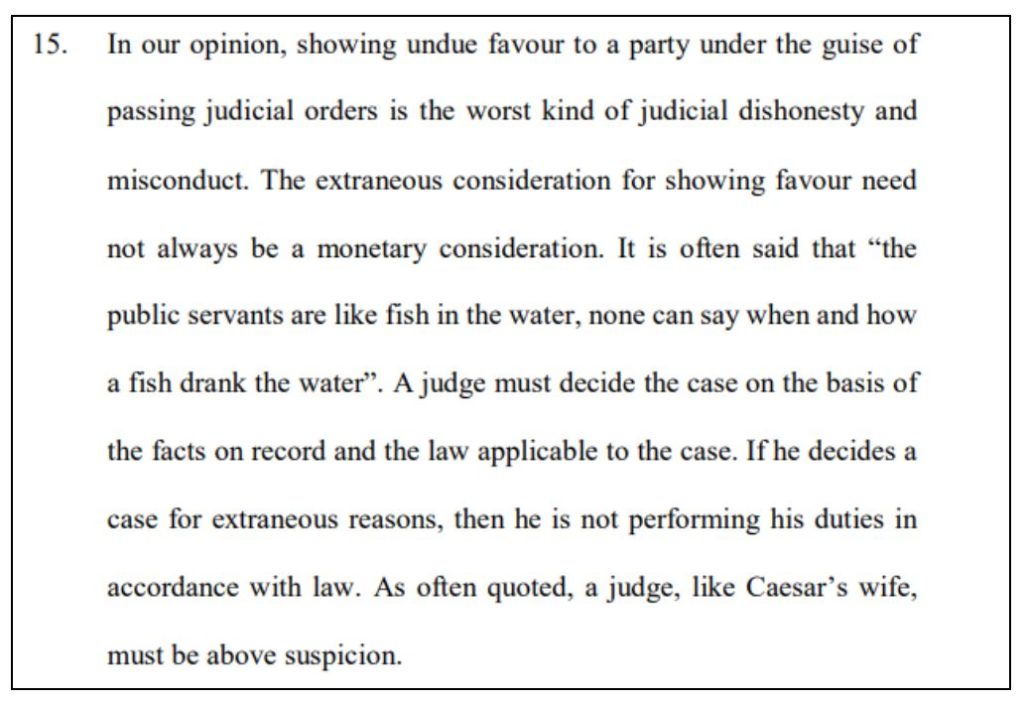
SC: No one should be forced to take vaccine
In Jacob Puliyel vs. Union of India, the petitioner was a former member of the National Technical Advisory Group of Immunization. He filed a writ petition challenging the constitutional validity of vaccine mandates as it was a violation of the rights of citizens. He also asked the Supreme Court to direct the Indian government to release detailed data on phase-wise vaccine trials and approvals in addition to the post-vaccination data on infection, hospitalization, and deaths due to infection, and adverse events.
Some of the important points put forth by the bench comprising Justices L Nageswara Rao and BR Gavai in their 115-page judgement are given below:
Article 21 of the Constitution protects the bodily integrity of individuals and so, no individual can be forced to get vaccinated. Persons who are not keen to get the vaccination because of personal beliefs or preferences cannot be forced to do so. However, if there is the possibility that such persons may contribute to spreading the infection, or to mutation of the virus, then the government may impose limitations on individual rights.
On the assessment of vaccine mandates imposed by states, the Bench noted that there was duality- the Union government has clearly stated that vaccination is voluntary whereas State governments have imposed restrictions on unvaccinated persons’ access to public places and resources. It also added that no substantial data was produced on record to show that the risk of transmission of COVID-19 virus from the unvaccinated persons is higher than from vaccinated persons because of which the restrictions on unvaccinated individuals imposed by State Governments / Union Territories through the mandates were proportionate. The Bench also suggested that the vaccine mandates imposed by States/UTs should be reviewed considering the rapidly evolving situation presented by the pandemic.
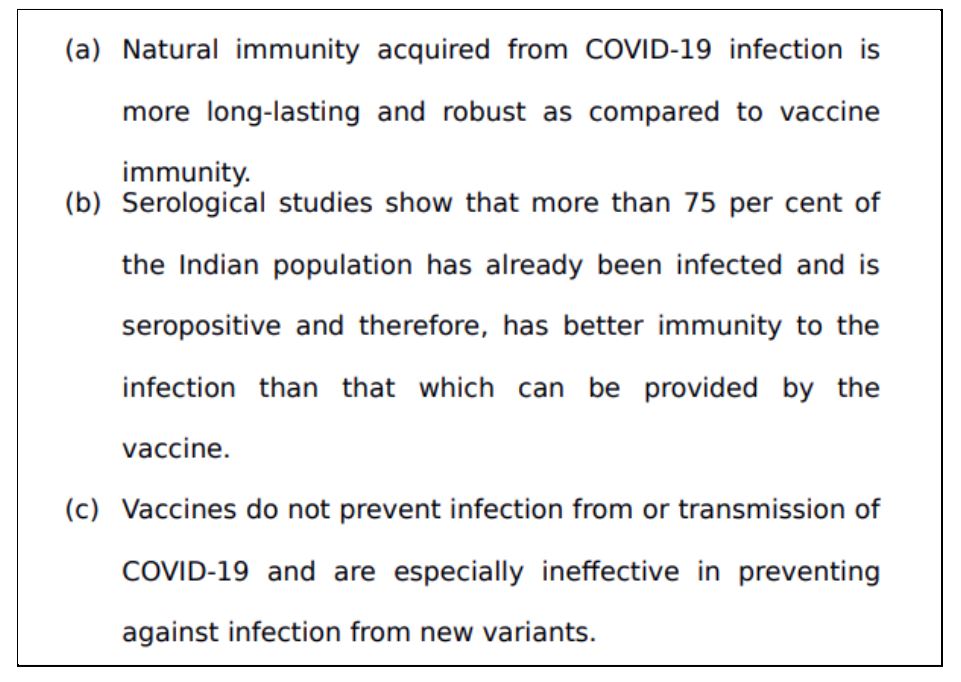
With respect to the Union government’s vaccination policy, the Bench opined that it was satisfied with the current vaccination policy of the Union since it was based on relevant considerations and that it was not unreasonable or manifestly arbitrary.
Noting that the results of Phase-III clinical trials of the vaccines Covishield and Covaxin have been published following the GCP guidelines and the WHO’s Statement on Clinical Trials, the court said that the approval was not given in haste. The Bench stated that lack of transparency could not be entertained and added that all relevant data required should be made public under the extant statutory regime without delay. Furthermore, it directed the Union to publish reports on Adverse Events Following Immunisation (AEFI) from the public and doctors such that it is accessible to the public. However, data of the individuals who are reporting the same should not be compromised. Regarding vaccines for children, the Bench stated that it was not possible for it to criticise the opinion of experts and the vaccination indeed follows the global standards and practices and asked the government to ensure that key findings and results of the relevant phases of clinical trials of vaccines approved for children should be made public at the earliest.
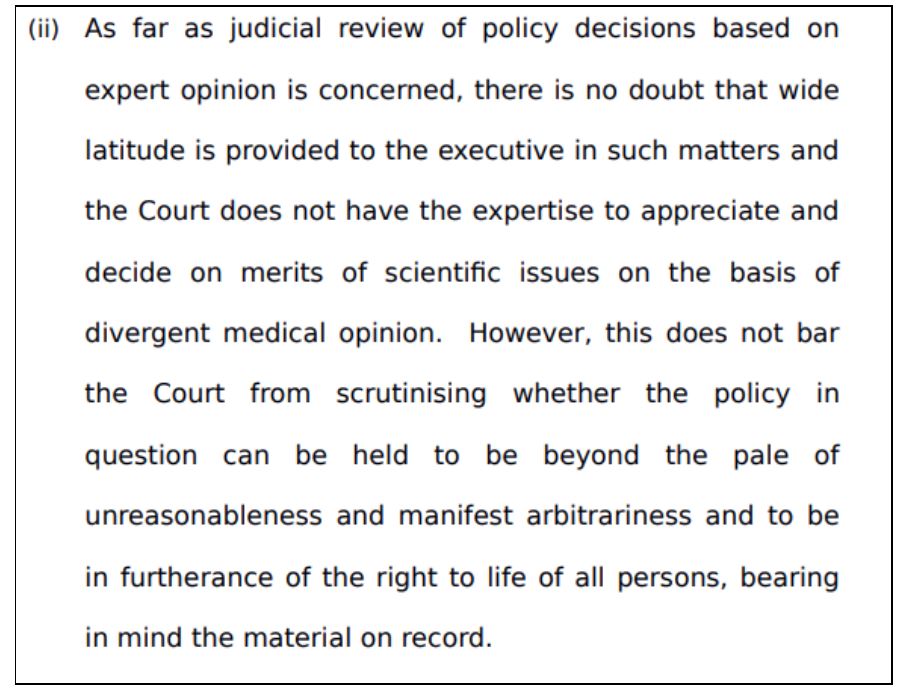
SC: Mere suppression of material information irrespective of whether there was a conviction or acquittal doesn’t mean that the employer can arbitrarily terminate an employee
In Pawan Kumar vs. Union of India, the appellant approached the Supreme Court against the decision of the Delhi High Court that approved the order to discharge him during the training as a constable in the Railway Protection Force for not disclosing a criminal case.
The Railway Protection Force Rules, 1987 state the following:

The Supreme Court Bench of Justices Ajay Rastogi and Sanjiv Khanna observed that no criminal case was instituted or pending against him on the date when the application form was filled, and so the appellant had not suppressed any information or submitted a false declaration at that stage. It also noted the nature of the allegations made in the criminal case and observed that the matter was of trivial nature not involving moral turpitude. Moreover, he was given a clean acquittal.
Referring to the judgment in Avtar Singh vs. Union of India and others, the Court stated that mere suppression of material/false information irrespective of whether there was a conviction or acquittal recorded doesn’t mean that the employer can arbitrarily terminate an employee. However, the employer must consider all the relevant facts and circumstances available in line with the objective criteria and relevant servant rules, to determine whether the employee can continue the service. Dismissing the High Court’s order, the SC Bench directed that the appellant be reinstated in service.
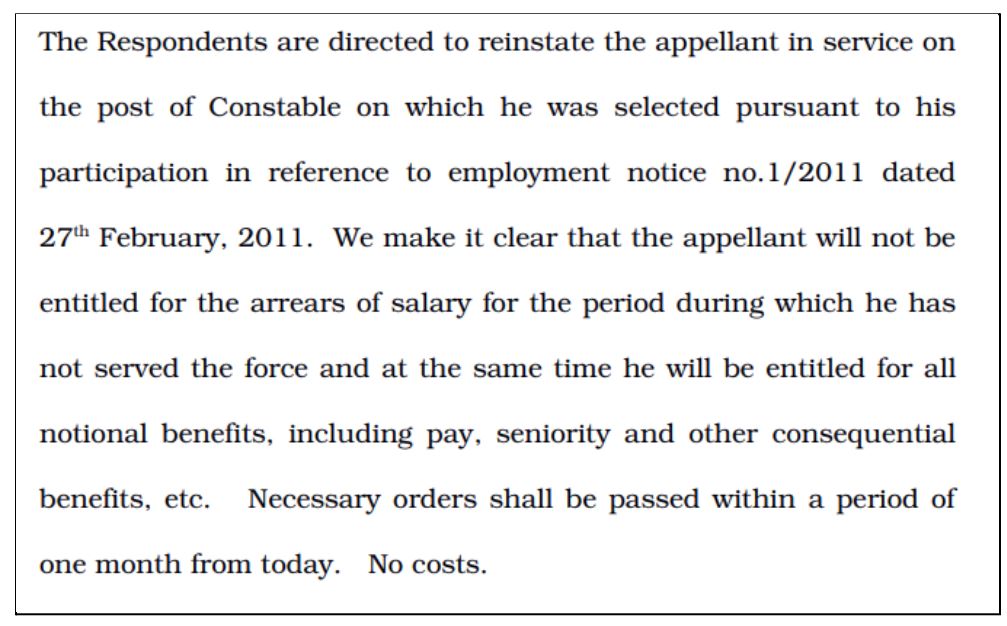
SC: The bail of a rape accused was cancelled since posters and hoardings were installed and his bail was welcomed in celebrated mood which displayed his power
The case, Ms P vs. State of Madhya Pradesh was regarding the bail of the accused in a rape case. The complainant had alleged that the accused had repeatedly committed sexual intercourse with her for over three years under the garb of a false promise to marry her. The accused, who was also a student leader studying law was granted bail by the Madhya Pradesh High Court.
The complainant then approached the Supreme Court seeking cancellation of bail since the accused was greeted in a celebration with posters reading “Bhaiyaa is Back” and “Welcome to Role Janeman”. There were images of the celebration on social media and some hoardings with his photographs were displayed prominently in the city and strategically placed in the localities where the complainant and her family resided and worked.
The SC Bench comprising of Chief Justice of India NV Ramana, Justice Krishna Murari and Justice Hima Kohli directed the accused to surrender within a week noting that posters with such captions to welcome the accused of a rape case can result in imprisonment for up to 10 years, will amplify the celebratory mood of the accused and his supporters and evoked fear in the complainant that the fair trial may be affected, as there was a likelihood of his influencing the material witnesses. It also noted that the photographs and captions on social media indicated the superior position and power wielded by him and his family in the society could be harmful for the complainant.
The Court also listed the circumstances for cancellation of bail-
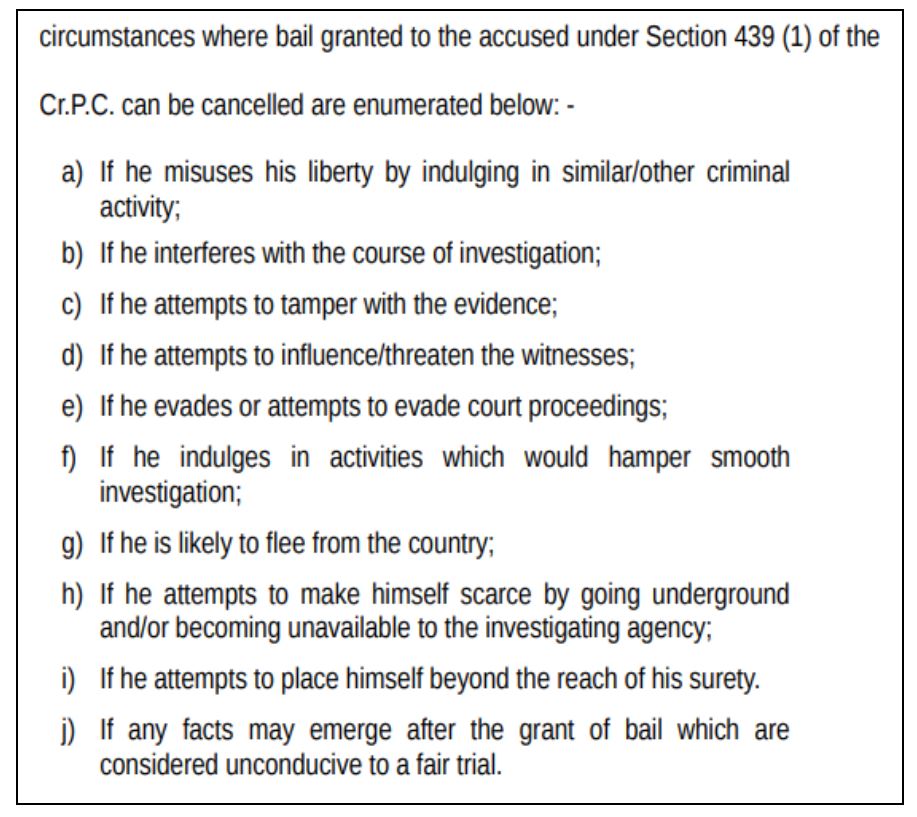
Directions for awarding marks for experience has been modified by the SC
In Indira Jaising vs. Supreme Court of India, the petitioner submitted that lawyers who have had the experience of 10 to 19 years are being allotted the same 10 marks by High Courts. These marks are considered for designation as senior advocates. She suggested that for 10 years of experience, 10 marks can be granted and then for every additional year of service, the lawyer may be rewarded with one mark. This was accepted by the Supreme Court Bench comprising Justices UU Lalit, S Ravindra Bhat, and PS Narasimha to modify the 2017 guidelines which gave 10 marks to all the lawyers with 10 to 20 years of experience. It clarified the following:
